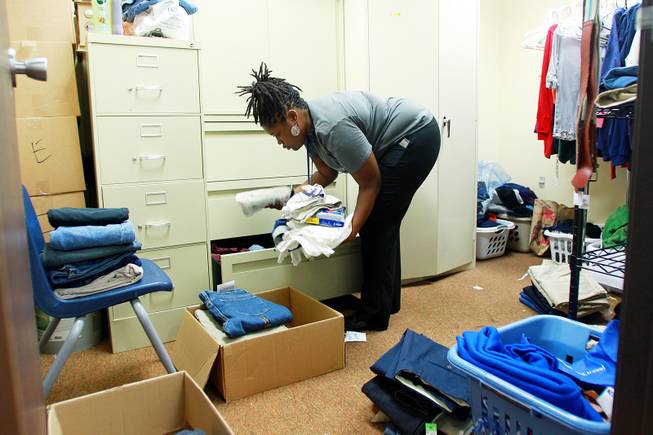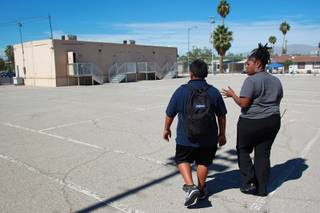
Sam Morris / Las Vegas Sun
Communities in Schools coordinator Kalan Washington looks through CIS supplies for some shorts and underwear to give to a handicapped student who had soiled their clothes at Bridger Middle School Tuesday, Oct. 9, 2012.
Friday, Aug. 9, 2013 | 2 a.m.
Sun coverage
One of Clark County's most powerful and well-connected nonprofit organizations is butting heads with the Clark County School Board, igniting a philosophical debate over the role schools should play in providing basic necessities to needy children.
Since 2004, Communities in Schools of Nevada has partnered with the Clark County School District to feed, clothe, supply and mentor thousands of disadvantaged children at 12 schools. Students who receive the help perform better academically, data indicate.
Next year, the nonprofit organization, founded by philanthropist and state Board of Education President Elaine Wynn, wants to expand its efforts to eight more schools. The organization has secured $7 million in private funding — $6 million from Wynn and $1 million from the Engelstad Foundation — to finance the expanded project. Now it wants the School District to pitch in $580,000 of its own money.
"We want the School District to have some skin in the game," the nonprofit's president, Susie Lee, says.
The School Board has balked, telling Communities in Schools to compete with other nonprofit groups for district funding. That bidding ended July 25, and the results are expected this month.
"I'm sold on your mission. I'm sold on your method," Clark County School Board member Erin Cranor told Communities in Schools officials in May. "I'm happy and thankful to continue as a partner with Communities in Schools, (but) I'm not willing to enter into an education-provider relationship without considering other options."
Other nonprofit groups can provide food, clothing and school supplies to students from low-income families, Cranor said. If the School Board "crossed the line" from being just a partner to a funder of partners, the School District would "regret it," as it opens the door for other groups, such as churches, nonprofits and parent organizations, to seek public funding.
But in fact, the School Board has granted public money to outside organizations.
It entered a $7.6 million contract with Edison Learning to operate seven local elementary schools, donated $5 million to the Smith Center for the Performing Arts to provide arts education and signed a $300,000 contract with nonprofit Teach for America to provide teacher training for 150 recent college graduates who are teaching here.
Other Nevada municipalities, such Las Vegas and North Las Vegas and the Elko County School District, also have donated money to Communities in Schools.
The organization has one of the largest and most visible models of providing so-called “wraparound” services to children. The national nonprofit group, which Wynn serves as chairwoman, has nearly 200 local affiliates that reach more than a million students in 27 states and Washington, D.C.
"I believe that this notion of integrated student support services is taking its place in education policy," Wynn said, stressing collaboration between government and other groups to improve education. "To help our children, we've got to be open-minded, creative and experimental."
But School Board member Linda Young contends that the district's $580,000 in federal funding should go toward educating children, not services that feed and clothe them. Those services should be the job of local governments and nonprofit groups, she said.
"My job is to do the academics," Young says. "I need all the money I can get to do the job at my school. We need more money for iPads and textbooks and Smartboards.
"We do need those wraparounds, no doubt. But I don't want to pay for it. I need the money for my classrooms."
Lee, on the other hand, believes schools have an obligation to provide for the overall welfare of children. Several schools in Clark provide food, clothing, haircuts and even dental checkups for students and families.
One notable example is Whitney Elementary School, whose students come mostly from low-income households and which has received millions of dollars in donations after being featured on CNN and the Ellen DeGeneres Show, among others.
Ninety percent of Clark County students who have received help from Communities in Schools graduate from high school, the organization says. Students participating in the program also saw major gains in attendance and grades.
"(Communities in Schools) is a hugely strong indicator of success," Superintendent Pat Skorkowsky says. "It has been an extremely successful partnership that has to be a priority."
Given the support of Wynn and Skorkowsky, who recently was named to the organization’s board of directors, Lee said she was "surprised there wasn't unanimous support" for Communities in Schools' expansion.
"Frankly, I'm scared for this community," Lee said. "We're losing another generation of kids if we don't act with urgency, with scale and with impact."


Join the Discussion:
Check this out for a full explanation of our conversion to the LiveFyre commenting system and instructions on how to sign up for an account.
Full comments policy